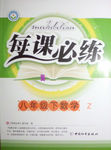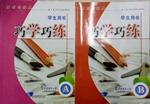题目内容
4.Let's go to find our manager in his office.It's so late at night.He be there.Let's make it another day.( )
| A. | can't | B. | needn't | ||
| C. | mustn't | D. | ought not to have been |
分析 --我们一起去经理办公室找找他吧!--太晚了.他不可能在那了,我们改天去吧!
解答 答案A.考查情态动词.根据句意空格处是对目前状况的有把握的推测,所以用can't be;needn't be 表示没有必要;must作为推测只用于肯定句,表示"一定是,肯定是".,oughtn't not have been 表示过去本不该做,而实际做了.
点评 对于情态动词的学习应该熟悉每个情态动词所表达的意义,特别是一些特殊情况的用法,根据句意来选择正确的答案.

练习册系列答案
 每课必练系列答案
每课必练系列答案 巧学巧练系列答案
巧学巧练系列答案
相关题目
15.Children are always taught not to argue with adults for generations. However,new research shows that young teenagers who are taught to argue(36)Aare more likely to resist peer pressure to use drugs and alcohol later in(37)C.
"It turns out that what goes on in the(38)Bis actually a training ground for teens in terms of how to(39)Dagreements with other people,"said Joseph Allen,the lead author of the study. He added that teens should learn they can be taken(40)Bthough discussions with their parents.
Sometimes,it can be unnatural for parents to(41)Ctheir teens to argue with them. But learningeffective argumentation(42)Acan help teenagers learn to become more (43)Dand how to protectthemselves.
The study observed 150 13-year-old engaging in arguments,and then (44)Athe same participants three years later about(45)Bwith drugs and alcohol.
At 13,the teenagers were(46)Csummarizing disagreements between themselves and their mothers.The recordings were then replayed for the mothers to hear.
The(47)Abetween them would go on to be discussed. The topic would(48)Dfrom household rules to grades to monthly allowances.Once the discussion was (49)Bagain,researchers filmed the teens and their mothers for eight minutes.Teenagers who displayed confidence and used reasons to(50)Ctheir statements were more likely to have refused drugs or alcohol.
Allen recommended parents should teach their children how to effectively(51)Dtheir thoughts and emotions during conflicts,which in turn teaches children to stand up to (52)Binfluence outside of the home.(53)Atheir viewpoints don't line up,the teens are going to be able take those skills into other environments. Parents should also teach by examples and(54)Cgood discussion practices for their children.
"If they're able to learn how to be confident and persuasive with their(55)B,they'll be able to do the same with peers,"Allen said.
"It turns out that what goes on in the(38)Bis actually a training ground for teens in terms of how to(39)Dagreements with other people,"said Joseph Allen,the lead author of the study. He added that teens should learn they can be taken(40)Bthough discussions with their parents.
Sometimes,it can be unnatural for parents to(41)Ctheir teens to argue with them. But learningeffective argumentation(42)Acan help teenagers learn to become more (43)Dand how to protectthemselves.
The study observed 150 13-year-old engaging in arguments,and then (44)Athe same participants three years later about(45)Bwith drugs and alcohol.
At 13,the teenagers were(46)Csummarizing disagreements between themselves and their mothers.The recordings were then replayed for the mothers to hear.
The(47)Abetween them would go on to be discussed. The topic would(48)Dfrom household rules to grades to monthly allowances.Once the discussion was (49)Bagain,researchers filmed the teens and their mothers for eight minutes.Teenagers who displayed confidence and used reasons to(50)Ctheir statements were more likely to have refused drugs or alcohol.
Allen recommended parents should teach their children how to effectively(51)Dtheir thoughts and emotions during conflicts,which in turn teaches children to stand up to (52)Binfluence outside of the home.(53)Atheir viewpoints don't line up,the teens are going to be able take those skills into other environments. Parents should also teach by examples and(54)Cgood discussion practices for their children.
"If they're able to learn how to be confident and persuasive with their(55)B,they'll be able to do the same with peers,"Allen said.
| 36.A. effectively | B. cleverly | C. actively | D.emotionally |
| 37.A. babyhood | B. childhood | C. adolescence | D.neighborhood |
| 38.A. office | B. family | C. school | D.house |
| 39.A.link | B. share | C. change | D.reach |
| 40.A. properly | B. seriously | C. correctly | D.carefully |
| 41.A. admit | B. forbid | C. allow | D.stop |
| 42.A. skills | B. purposes | C. reasons | D.results |
| 43.A. trustful | B. legal | C. humorous | D.confident |
| 44.A. researched | B. advised | C. persuaded | D.warned |
| 45.A. satisfactions | B. experiences | C. intentions | D.desires |
| 46.A. tracked | B. kept | C. recorded | D.considered |
| 47.A. disagreements | B. discussions | C. debates | D.agreements |
| 48.A. shift | B. move | C. turn | D.range |
| 49.A. raised | B. started | C. prevented | D.continued |
| 50.A. present | B. stress | C. support | D.tell |
| 51.A. prove | B.list | C. develop | D.express |
| 52.A. fierce | B. negative | C. positive | D.cruel |
| 53.A. Even if | B. As long as | C. As soon as | D.In case |
| 54.A. conclude | B. hang | C. show | D.lead |
| 55.A. classmates | B. parents | C. relatives | D.friends |
| 55.A.classmates | B.parents | C.relatives | D.friends |
19.Taking charge of the big company,I'm afraid,is _____ his ability.( )
| A. | beyond | B. | within | C. | of | D. | to |
9.It's wrong for us to play tricks ________our parents.( )
| A. | with | B. | on | C. | to | D. | at |